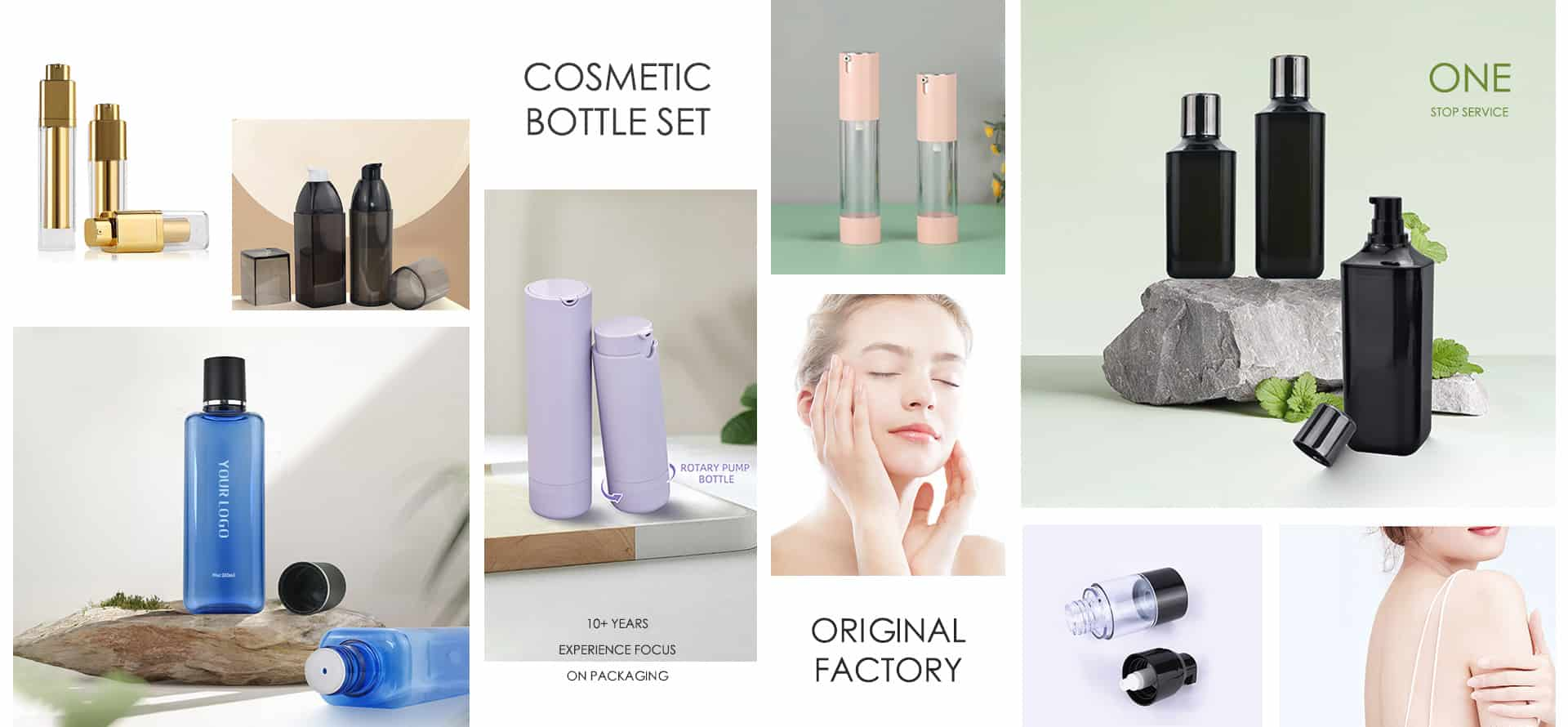Cosmetic packaging stands as a crucial bridge between product and consumer, marrying functionality with aesthetic appeal. Among the diverse array of packaging solutions, cosmetic bottles emerge as essential vessels for housing an array of beauty formulations, from serums and lotions to fragrances and oils. These bottles, crafted in various materials and designs by manufacturers worldwide, not only preserve the integrity of the product but also serve as a canvas for brand identity and consumer engagement. In this comprehensive exploration, we delve into the realm of cosmetic bottles, uncovering the myriad types, materials, and applications that define this indispensable component of the beauty industry.

Meet raw materials to manufacture cosmetic bottles:
Plastic: Plastic is one of the most widely used materials for cosmetic bottles due to its versatility, affordability, and lightweight nature. Common types of plastic used include PET (polyethylene terephthalate), HDPE (high-density polyethylene), LDPE (low-density polyethylene), PP (polypropylene), and PVC (polyvinyl chloride). Plastic bottles are available in various shapes, sizes, and colors, making them suitable for a wide range of cosmetic products.
Glass: Glass is favored for its premium appearance, durability, and ability to preserve the integrity of cosmetic formulations. Glass bottles offer excellent barrier properties, protecting sensitive ingredients from light, moisture, and air. They are commonly used for high-end skincare products, perfumes, and luxury cosmetics.
Aluminum: Aluminum bottles are lightweight, durable, and recyclable, making them an eco-friendly option for cosmetic packaging. Aluminum bottles offer excellent barrier properties, protecting products from light, moisture, and air. They are often used for packaging fragrances, hair care products, and body sprays.
Stainless Steel: Stainless steel bottles are durable, corrosion-resistant, and non-reactive, making them suitable for storing a wide range of cosmetic formulations. Stainless steel bottles are commonly used for packaging perfumes, lotions, and serums, particularly in travel-sized or on-the-go formats.
Bioplastics: Bioplastics are derived from renewable sources such as cornstarch, sugarcane, or cellulose, making them more sustainable alternatives to traditional plastics. Bioplastic bottles offer similar properties to conventional plastics, including versatility, durability, and lightweight nature. They are increasingly used in eco-friendly and sustainable cosmetic packaging solutions.
Recycled Materials: Recycled materials, including recycled plastic (rPET) and recycled glass, are gaining popularity as sustainable options for cosmetic packaging. By using recycled materials, manufacturers can reduce the environmental impact of packaging production and contribute to a circular economy.
Different types and according to applications of cosmetic bottles:
Pump Bottles:
Applications: Ideal for liquid products such as lotions, serums, liquid soaps, and creams.
Features: Equipped with a pump mechanism for easy dispensing and controlled dosage.
Spray Bottles:
Applications: Suitable for products requiring a fine mist, such as perfumes, facial mists, hair sprays, and body spritzers.
Features: Equipped with a spray nozzle for uniform and controlled application.
Dropper Bottles:
Applications: Perfect for precise dispensing of liquids, including serums, facial oils, and essential oils.
Features: Includes a glass or plastic dropper for accurate dosage and application.
Roll-On Bottles:
Applications: Used for roll-on application of products such as perfumes, eye creams, and spot treatments.
Features: Features a roller ball applicator attached to the bottle neck for convenient and mess-free application.
Squeeze Bottles:
Applications: Ideal for dispensing viscous or thick formulations like shampoos, conditioners, and body washes.
Features: Made of flexible plastic for easy squeezing and dispensing of the product.
Glass Bottles:
Applications: Commonly used for high-end skincare products, perfumes, and luxury cosmetics.
Features: Known for their durability, premium appearance, and ability to preserve the integrity of formulations.
Plastic Bottles:
Applications: Versatile options for packaging a wide range of cosmetic products, including lotions, body washes, and hair care products.
Features: Lightweight, cost-effective, and available in various shapes, sizes, and colors.
Airless Bottles:
Applications: Suitable for preserving the potency and freshness of sensitive formulations such as antioxidants, vitamins, and natural extracts.
Features: Utilizes a vacuum pump mechanism to prevent exposure to air and contaminants, ensuring product integrity.
Frosted Bottles:
Applications: Often used by luxury skincare and fragrance brands to convey elegance and sophistication.
Features: Frosted or matte finish for a premium look and feel.
Copyright © 2025 Guangzhou Lisson® Plastic Co.Ltd | All Rights Reserved.
Hello, please leave your name and email here before chat online so that we won't miss your message and contact you smoothly.